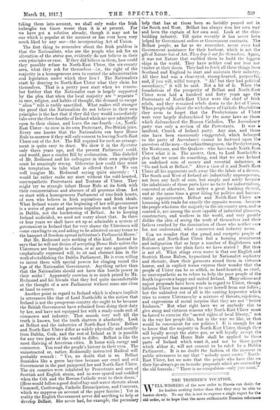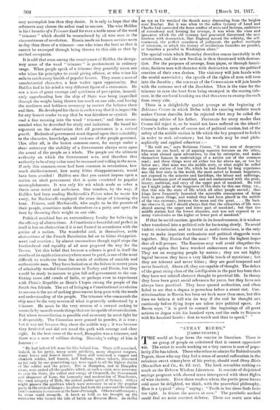THE 'TRIMMER'S VOCATION.
WELL-WISHERS of the new order in Russia can desire for its leaders nothing better than that they may be able to hasten slowly. To say this is not to, express a single regret for the old order, or to hope that the more enthusiastic Russian reformers
may accomplish less than they desire. It is only to hope that the reformers may choose the safest road to success. The wise Halifax in his Character of a Trimmer fixed for ever-a noble sense of the weird " trimmer " which should be remembered by all wise men in the circumstances of revolution. Russia needs no human services more to-day than those of a trimmer—one who trims the boat so that it cannot be swamped through being thrown to this side or that by excited occupants.
It is odd that even among the countrymen of Halifax the deroga- tory sense of the word " trimmer " is predominant in ordinary usage. When people speak of a trimmer they generally mean one who trims his Principles to avoid giving offence, or who trims his sails to catch every breath of popular favour. They mean a man of unsubstantial character, a base waiter upon opportunity. But Halifax had in his mind a very different figure of a statesman. He
saw a man of great courage and quickness of perception, immedi- ately apprehending how the ship of State was being imperilled
through the weight being thrown too much on one side, and having the readiness and boldness necessary to correct the balance there
and then. He developed his thesis in such a way that it is impossible for any honest reader to say that he was frivolous or cynical. Ho read a fine meaning into the word " trimmer," and then recom- mended what he described for study and imitation. He based his argument on the observation that all government is a natural growth. Methods of government must depend upon their suitability to the character, knowledge, and customs of the people governed. This, after all, is the barest common-sense, for except under a sheer autocracy the stability of a Government always rests upon the assent of the people as a whole. The people are the ultimate authority on which the Government acts, and therefore that authority to be of any value must be reasoned and willing in the mass. If only this common-sense had been common in revolutions, how much disillusionment, how many bitter disappointments, would have been avoided ! Halifax saw that you cannot impose upon a nation an ideal government that is quite unrelated to popular accomplishments. It was only his wit which made so sober a thesis seem novel and audacious. One wonders, by the way, if Halifax had been reading Machiavelli's Prince when he wrote his essay, for Machiavelli employed the same image of trimming the boat. Princes, said Machiavelli, who ought to be the parents of their people, sometimes make themselves as a party and upset the boat by throwing their weight on one side.
Political mankind has an extraordinary faculty for believing in the efficacy of abstractions. A Constituticn beautiful and perfect in itself is but an abstraction if it is not framed in accordance with the genius of a nation. The wonderful and, in themselves, noble abstractions of the French Revolution led on to bitter disappoint- ment and reaction ; by almost unconscious though rapid steps the brotherhood and equality of all men prepared the way for the Terror. Yet this belief that because a scheme is gocd in itself the results of its application everywhere must be good, is one of the most difficult to eradicate from the minds of millions of amiable and enthusiastic men. They have looked on at the failure in recent years of admirably worded Constitutions in Turkey and Persia, but they would be ready to-morrow to give full self-government to the con- flicting races and creeds of India, or perhaps even to experiment with Plato's Republic or l■fore's Utopia among the people of the South Sea Islands. The art of bringing a Constitutional revolution to success is the art of-making government keep pace with the needs and understanding of the people. The trimmer who commands the ship must be the very reverse of what is generally understood by a trimmer. He must be the very reverse of a coward seeking to reconcile by smooth words things that are incapable of reconciliation. But where reconciliation is possible and necessary he must fight for it desperately. The Girondins were ground to powder, it is true ; but it was not because they chose the middle way ; it was because
they hesitated and did not tread the path with courage and clear sight. In the best sense of the word, Hampden was a trimmer, and there was a man of sublime daring. Macaulay's eulogy of him is famous :— " He had indeed left none his like behind him. There still remained, indeed, in his party, many acute intellects, many eloquent tongues, many brave and honest hearts. Thero still remained a rugged and clownish soldier, half fanatic, half buffoon, whose talents, discerned as yet only by one penetrating eye, were equal to all the highest duties of the soldier and the prince. But in Hampden, and in Hampden alone, were united all the qualities which, at such a crisis, were necessary to save the State, the valour and energy of Cromwell, the discernment and eloquence of Vane, the humanity and moderation of Manchester, the stern integrity of Hale, the ardent public spirit of Sydney. Others might possess the qualities which were necessary to • save the popular party in the crisis of danger ; he alone had both the power and the Molina- t ion to restrain its excesses in the hour of triumph. Others could conquer; he alone could reconcile. A heart as bold as his brought up the cuirassiers who turned the tide of battle on Marston Moor. As skilful
an eye as -his watched -the Scotch army descending from the heights over Dunbar. But it was when to the sullen tyranny of Land and Charles had succeeded the fierce conflict of sects and factions, ambitious of ascendency and burning for revenge, it was when the vices and .ignorance which the old tyranny had generated threatened the new freedom with destruction, that England missed the sobriety, the self- command, the perfect soundness of judgment, the perfect rectitude of intention, to which the history of revolutions furnishes no parallel, or furnishes a parallel in Washington alone."
The special crisis which Macaulay describes comes inevitably in all revolutions, and the new freedom is then threatened with destruc- tion. For the purposes of revenge, from pique, or through fanati- cism, factious men will threaten with destruction even the political creation of their own desires. The visionary will join hands with the sordid materialist ; the apostle of the rights of man will turn into the Jacobin ; the remnant cf the Camel anima will join hands with the extreme sect of the Jacobites. Then is the time for the trimmer to save the boat from being swamped in the roaring tide- race, in the confused breaking sea that threatens to swamp the craft from every side.
Thero is a delightfully quaint passage at the beginning of Robinson Crusoe in which Defoe with his amazing realistic touch
makes Crusoe describe how he rejected what may be called the trimming advice of his father. Fortunate for every reader that Crusoe did reject it, or he would not have suffered on the island ! Crusoe's father spoke of course not of political caution, but of the safety of the middle station in life w ]rich the boy proposed to forfeit in order to seek adventure ; but his words may he read philo-
sophically and applied otherwise :-
" He told me," says Robinson Crusoe, " it was men of desperate fortunes on one hand, or of aspiring superior fortunes en the other, who went abroad upon adventures, to rise by enterprise, and make themselves famous in undertakings of a nature out of the common road ; and these things were all either too far above me, or too far below me ; that mine was tho middle state, or what might be called the upper station of low life, which he bad found by long experience was the best state in the world, the most suited to human happiness, not exposed to the miseries and hardships, the labour and sufferings, of the mechanic part of mankind, and not embarrassed with the pride, luxury, ambition, and envy of the upper part of mankind. He told me I might judge of the happiness of this state by this one thing, viz.,. that this was the state of life which all other people envied; that kings have frequently lamented -the miserable consequence of being born to great things, and wished they had been placed in the middle of the two extremes, between the mean and the great. . . . He bade me observe it, and I should always.find that the calamities of life were shared among the upper and lower .part of mankind; but that the middle station had the fewest disasters, and was not exposed to b0 many vicissitudes as the higher or lower part of mankind."
If that be social caution, ignoble in its humdrumness, it is wisdom when translated into a political rule for hastening slowly. To avoid violent vicissitudes, and to travel in medio tutissimus, is the only way to make impatient enthusiasts and political sluggards work together. May Russia find the man ! We have the highest hopes that all will prosper. The Russians may well avoid altogether the vengeful spites that have wrecked endeavours as 'fine as theirs. They are an easygoing people by nature ; they are not highly logical because they have a very likable touch of mysticism; but they are tolerant and never bitter ; they are good-tempered and never fanatical. Above all, they are capable of thought. The defect of the great rising class of the intelligentsia in the past has been that they have not related abstract thought to practical life. In theory they have been great social reformers for years, but they have not always been practical. They have quoted authorities, and often failed to see that a dogma -is powerless before a street riot. Con stitutionalism in Russia has been set back more than once, but this time we believe it will win its way if the end be thought out cautiously before flying leaps are taken into political space. As Bacon says, " it is good to commit the beginnings of all great actions to Argus with his hundred eyes, and the ends to Briareus with his hundred hands : first to watch and then to speed."



























 Previous page
Previous page